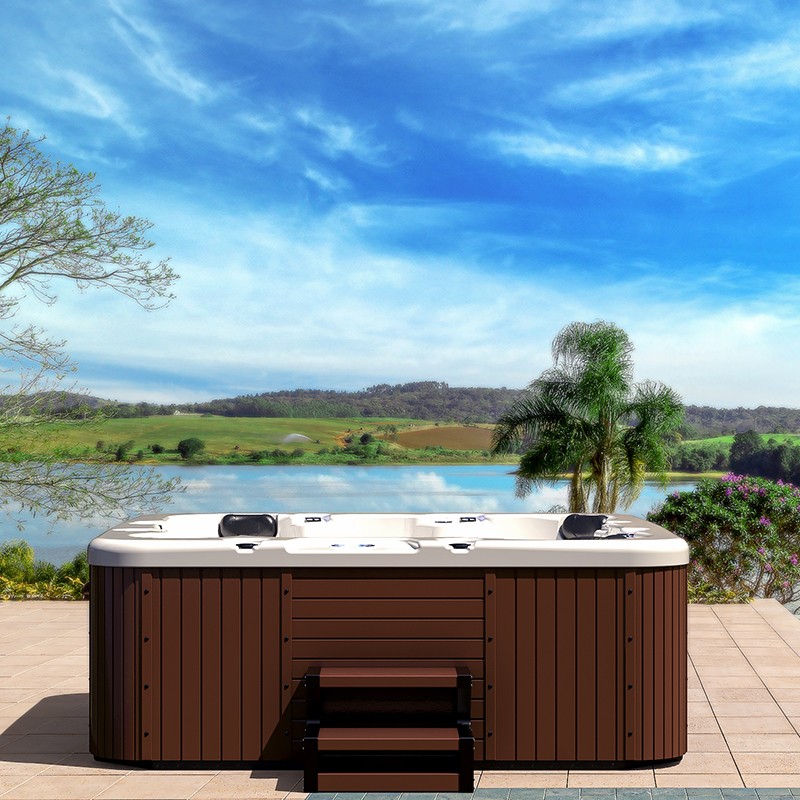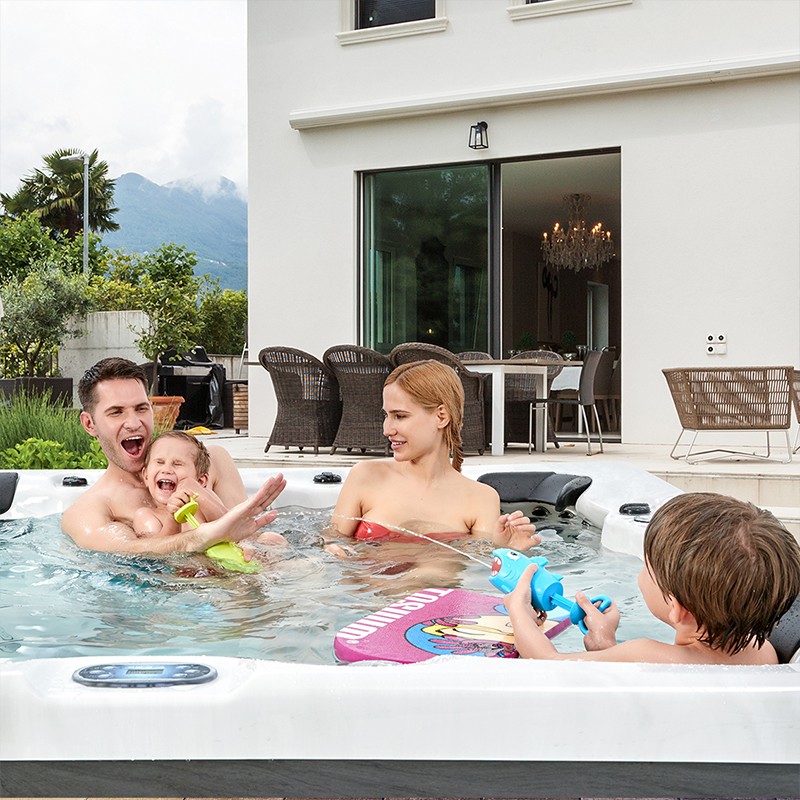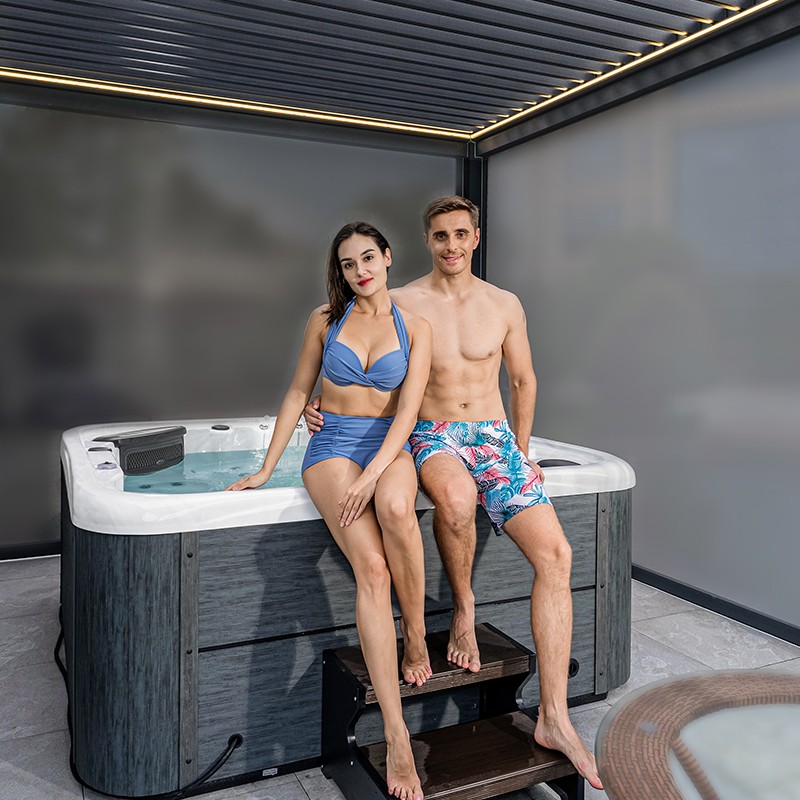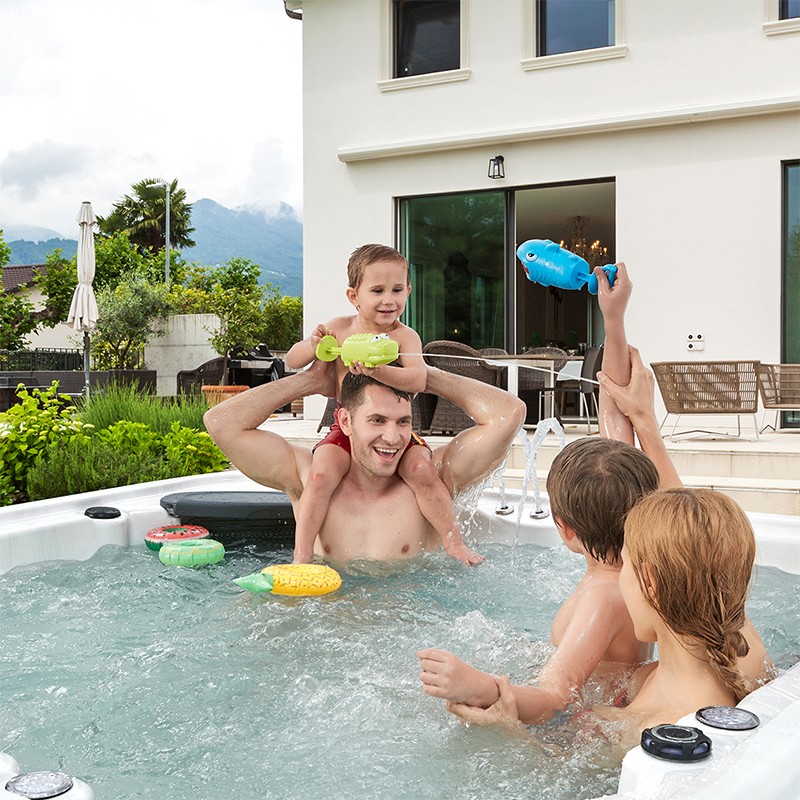
Outdoor Spa Jacuzzi: Is a Water Softener Necessary?
2025-09-27 15:30Whether in your backyard or at a resort or spa center, outdoor spa jacuzzis are incredibly popular for the comfortable hydrotherapy experience they offer. However, despite the increasing sophistication of these tubs' designs and features, water quality is often overlooked.
Many users ask, "Is it necessary to install a water softener for an outdoor spa jacuzzi?" This question is not universally accepted, as it depends on a variety of factors, such as the hardness of the source water, the degree of water pollution, and the local environmental characteristics.
This article will analyze in detail the question of whether an outdoor spa jacuzzi should be installed with a water softener. It will cover the working principles of a water softener, the advantages and disadvantages of installing one, its impact on the spa jacuzzi tub, and considerations for selecting a softener, to help consumers make the right decision.

Water Softener: How Does It Work?
1. Function of a Water Softener
A water softener primarily reduces water hardness. Water hardness is generally determined by dissolved minerals, particularly calcium and magnesium ions. Hard water contains high concentrations of calcium and magnesium. These minerals not only affect water clarity but can also damage household appliances, plumbing, and spa facilities.
A water softener works by replacing calcium and magnesium ions in water with sodium (or potassium) ions through ion exchange. This softens water, resulting in "soft" water with significantly reduced concentrations of calcium and magnesium ions, resulting in clearer water and less deposits and damage associated with hard water.
2. Water Softener Structure
A water softener typically consists of three components:
• Resin tank: Contains specialized resins that exchange ions with calcium and magnesium ions in water, absorbing them and releasing sodium ions.
• Brine tank: Stores brine (sodium salt solution) during the water softener's regeneration process, cleaning the resin tank and restoring its exchange capacity.
• Control valve: Adjusts the direction and rate of water flow, controlling the flow into and out of the resin tank to ensure a smooth softening process.
3. The Impact of a Water Softener on a Spa Jacuzzi Tub
For outdoor spa jacuzzis, a water softener can remove minerals from the water, mitigating the various negative effects of hard water on the tub, particularly deposits, scaling, and water turbidity.

What are the effects of hard water on outdoor spa jacuzzis?
1. Damage to Spa Equipment Due to the presence of high levels of calcium and magnesium ions in hard water, outdoor spa jacuzzis using hard water are prone to the following problems:
• Scale Deposition: Calcium and magnesium ions present in water for extended periods of time can easily form scale on the tubing, heating elements, nozzles, and other components of an outdoor spa jacuzzi. This scale deposit not only affects water flow but also reduces heating element efficiency, increases energy consumption, and may even damage the tubing.
• Pipe Clogs: Minerals in hard water accumulate inside pipes, potentially causing blockages and hindering water flow, impacting the proper functioning of the spa.
• Turbid Water: Hard water can easily cause the water to appear cloudy during a spa session, especially after prolonged use. Suspended matter in the water can make the water appear dirty, affecting the spa experience.
2. Impact of Hard Water on Skin
Prolonged use of an outdoor spa jacuzzi with hard water may negatively impact the skin, especially for those with sensitive skin. Minerals in hard water can leave microscopic deposits on the skin, causing dryness, tightness, or allergic reactions. Furthermore, the high mineral content of hard water can cause unstable foam in the jacuzzi tub, affecting the effectiveness of the spa treatment.
3. Impact on Spa Treatment Effectiveness
Hard water can also affect the effectiveness of a spa treatment. Calcium and magnesium ions in the water restrict its fluidity and softness, reducing the comfort of the water massage.

What are the advantages and disadvantages of installing a water softener?
1. Benefits of Installing a Water Softener
• Reduces Scale Deposits: Softened water effectively reduces the concentration of calcium and magnesium ions, preventing scale from depositing inside your outdoor spa jacuzzi, on the pipes, and on the heating elements, thereby extending the lifespan of your spa jacuzzi.
• Improves Spa Comfort: A spa jacuzzi using softened water provides a smoother water flow and clearer, less turbid water, enhancing the comfort of your spa experience.
• Protects Skin Health: Softened water is more skin-friendly, less likely to cause dryness and irritation, and a spa jacuzzi using softened water is gentler on the skin.
• Reduces Maintenance Costs: A water softener effectively reduces the accumulation of scale and minerals, reducing the frequency of cleaning and maintenance of your spa jacuzzi, saving time and money.
• Improves Energy Efficiency: Scale accumulation reduces heating efficiency. Softened water improves the efficiency of heating equipment, thereby reducing energy consumption.
2. Disadvantages of Installing a Water Softener
• High Initial Investment: Installing a water softener requires equipment and installation fees, which can be a significant expense for some consumers.
• Regular Maintenance Required: Water softeners require regular addition of brine to regenerate the resin, increasing maintenance workload and costs.
• Potential Impact on Water Taste: Softened water has a high sodium ion concentration. While beneficial for outdoor spa jacuzzi use, some people may dislike this "salty" taste, especially if the softened water is consumed directly.

Outdoor Spa Jacuzzi: Should I Install a Water Softener?
1. The Impact of Source Water Hardness
The most critical factor in determining whether an outdoor spa jacuzzi requires a water softener is the source water hardness. Source water hardness varies by region. If your area has hard water, particularly high concentrations of calcium and magnesium ions, installing a water softener will help improve the lifespan of your spa jacuzzi tub and enhance the spa experience. If the water source in your area is soft or pure, installing a water softener may not be necessary.
2. The Impact of Spa Jacuzzi Tub Usage Frequency
If your outdoor spa jacuzzi is frequently used, especially by multiple people, a water softener is particularly important. Hard water quickly causes scale deposits, and frequent use exacerbates wear and tear on the equipment. For spa jacuzzi tubs used occasionally, the need for a water softener may not be as urgent as for more frequent use.
3. Water Softener Installation Cost
When installing a water softener, you need to consider both the initial investment and ongoing maintenance costs. If you're on a tight budget or only plan to use your outdoor spa jacuzzi for a short period of time, installing a water softener may not be cost-effective. However, in the long run, installing and maintaining a water softener can reduce scale buildup and equipment damage, effectively saving on future repair costs.
Can distributors request exclusive regional supply rights?
Yes, for serious distributors who purchase in bulk, we offer the possibility of exclusive regional supply agreements. This allows partners to represent the Lovia Spa brand in their market while enjoying low price purchasing, factory promotions, and wholesale discounts. By working directly with our company, distributors can grow their sales with the support of a trusted manufacturer.
